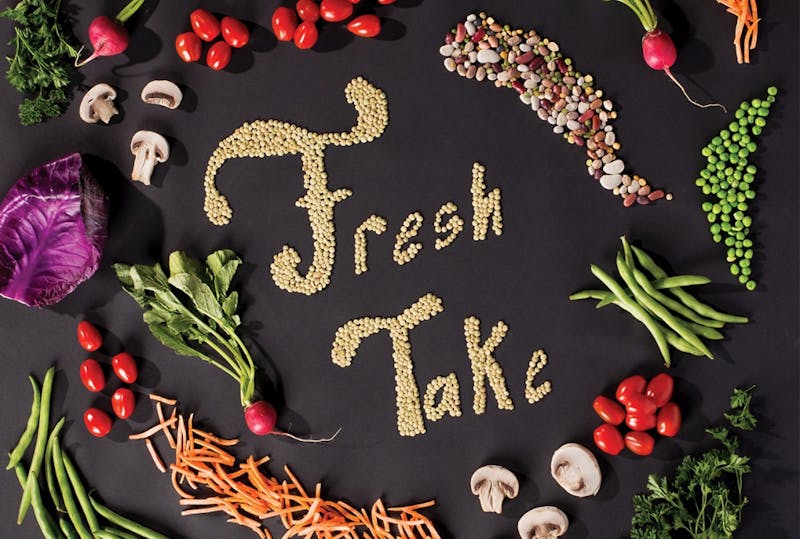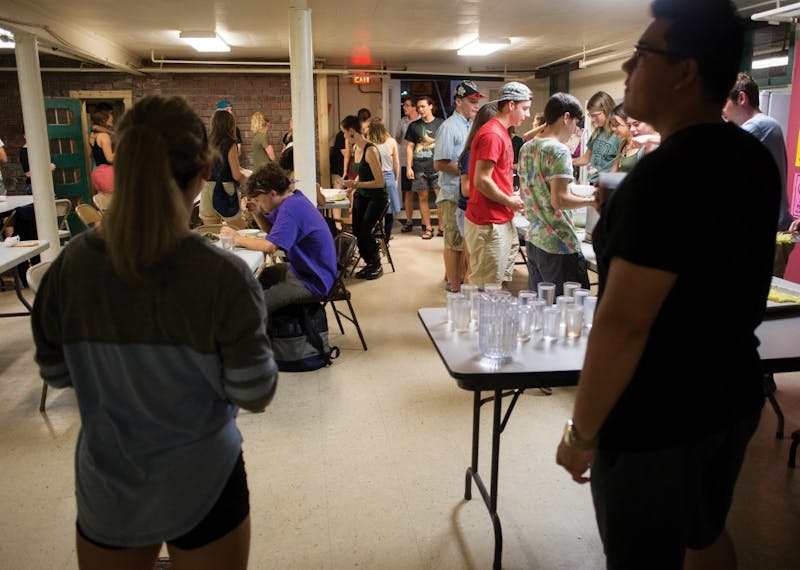
KELLY BONDRA


KELLY BONDRA
Tegan Strauss’s lifestyle change started with a bet.
A few years ago, her cousin challenged her by saying she could not become a vegan. Being a vegan meant she would no longer eat any meat or dairy products. But Strauss, a freshman studying psychology, accepted the challenge and found new inspiration by sticking to the strict diet.
Now, she has not eaten any meat or animal by-products for more than a year.
“I did some research and found the videos about the food industry and stuff and then I was like, ‘Nope, that’s not for me,’ ” she said.
But Strauss has encountered some people who criticize her vegan diet.
“Vegans shouldn’t have a negative connotation, because a lot of them do,” she said. “We’re cool people. We’re not all mean to people who eat meat, we just like animals.”
Converting to a vegan diet could mean dealing with complications other than cravings for cheese and chicken wings. Ohio University students who are vegan may face shaming for their lifestyle choices, health complications due to nutrient deficiencies and challenges when trying to find vegan-friendly meals in the dining halls.
Moira Snuffer, a senior studying sculpture, has also encountered some shaming for being vegan from friends and a professor.
“I’ve had people come up to me and say I look healthy for a vegan,” she said. “It’s just kind of insulting in that way.”
People often react negatively to veganism and people who are vegan because it is not considered a mainstream lifestyle, Edita Birnkrant, the campaigns director for Friends of Animals, said. Friends of Animals is an international non-profit animal advocacy group that promotes veganism as a way to improve animal welfare.
“I think one of the reasons we see negative reactions from some people is because anything that isn’t mainstream is going to seem odd,” Birnkrant said. “For many people it’s been ingrained and we’ve been brainwashed in a sense to think that we need meat and dairy and eggs to be healthy, but that isn’t the case.”
The International Vegan Association defines a vegan as “a person committed to abstaining from using animals and animal products for food, clothing, entertainment, and other purposes.”
Rachel McDonald, a sophomore studying global studies, has been vegan for almost a year. She transitioned from eating meat and dairy over the course of a few months with the help of her mother, who has been vegan for several years.

EMILY MATTHEWS
People line up for a vegan and gluten-free meal at the vegan cooking workshop on Sept. 6. The meal consisted of spiced cauliflower, curried chickpeas and dhal, carrot ginger soup, and mango coconut ladoo.
McDonald, who said she draws inspiration for her vegan meals from posts on the app Instagram, said her love for cooking made her vegan transition a fun challenge.
“Try new things,” she said. “You don’t have to not enjoy what other people are enjoying, you can just change it up a bit to make it work.”
About 2 percent of adults in the U.S. consider themselves vegan, according to a 2012 Gallup survey. The survey concluded that vegans consider themselves to be completely separate from vegetarians, rather than a subset.
Vegans are typically thinner, have lower cholesterol, lower blood pressure and are less at-risk for heart disease, according to a study published by the American Journal of Clinical Nutrition in 2009.
Deborah Murray, the undergraduate coordinator of food and nutrition sciences, said although plant-based diets can contribute to positive health benefits, eliminating animal products could potentially cause nutrient deficiencies, particularly in calcium and protein.
“Veganism can be a very healthful lifestyle,” Murray said. “But what is acknowledged is that there is a handful of nutrients that are at risk when meat and dairy go out the window.”
Other nutrients vegans can lack include iron, zinc and B-12. Having a deficiency in those nutrients can cause an increased risk for anemia, which is a red blood cell deficiency. That deficiency can also cause psychological and neurological abnormalities, such as disorientation, dementia and difficulty with concentration, according to the American Journal of Clinical Nutrition.
Murray said vegans are able to get the protein they need by eating foods such as beans, legumes and nuts, and dairy alternatives such as soy and almond milks can provide calcium.
But for some college students, the positive health effects of veganism could outweigh the potential nutritional risks.
PETA said the number of universities that received an “A” rating on their Vegan Report Card has more than doubled since 2013, while the number that received a “B” rating has more than tripled. The criteria for receiving an “A” rating includes labeling vegan entrees and desserts, offering non-dairy milk and at least one vegan option at every meal.
According to PETA’s report, Ohio University received an “A” grade on its 2015 Vegan Report Card.
Despite PETA’s analysis, McDonald said navigating the dining halls can be challenging.
“Sometimes the dining halls are hard, but if you have rice, beans and vegetables, you’ve got a full meal, and usually the dining halls have that,” she said. “In college, I eat potatoes and sweet potatoes a lot. You can cook them in a microwave.”
EMILY MATTHEWS
Murray said Athens is full of “little treasures” for vegan nutrition, such as the weekly farmers market and the promotion of local produce through organizations such as the Community Food Initiatives. She said the university also does a good job of offering healthy vegan options in the dining halls and markets, particularly The District on West Green.
“I really think students have more options than ever within the university,” she said.
Students with dietary restrictions who choose to dine on campus can schedule an appointment with a registered dietitian through OU Culinary Services, according to Culinary Services’ website.
Dining halls also label vegan options, saying food bearing the label is prepared with no animal or dairy products, including honey, gelatin or rennet, according to the website.
“We try to find new and different (and tasty) ways to offer plant-based diet options,” OU spokesperson Dan Pittman said in an email. “Culinary Services has done much through renovations and menu revisions in the past few years to greatly increase the number of vegan options.”
Pittman said Culinary Services increased its focus on providing vegan and vegetarian options in recent years.
Some vegan students, however, do not find the dining halls to be sufficiently vegan-friendly.
Ally Valeda-Maiden, a junior studying specialized studies in human relations, said she is “mostly vegan,” but found the dietary restrictions difficult when she came to OU.
“One of the main reasons I started eating meat in college was because I was tired of (the) lentil salad every day in the dining hall,” she said.
Snuffer, who used to be a student leader in a dining hall, said she had to be imaginative to find food that suited her vegan diet by finding different pieces of her meal at different stations.
“The chefs don’t understand veganism a lot of times, and the university just does it to get a name,” Snuffer said. “They just want to get that ‘A’ rating on the PETA website.”
The student organization Conscious Ohio offers a weekly vegan cooking workshop, which is another option for students looking for a meal outside of the dining hall.
Snuffer, who is the president of Conscious Ohio, said there can be anywhere from 20 to 120 people who come to eat, but not all who attend are vegan.
In the past, they have put vegan spins on non-vegan favorites by crafting things like buffalo wings made from cauliflower.
Snuffer said the vegan component of the meal is not the most important aspect.
“It’s not just about the vegan diet, it’s about getting people together to just enjoy a meal together as friends and family,” she said.